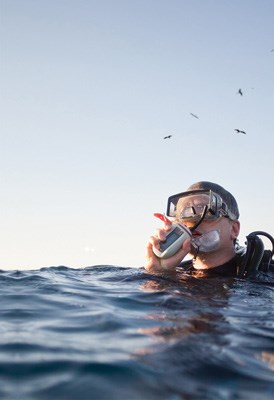Hes spent years of his life devoted to finding a way to save others and watched thousands of dollars disappear down the drain in the process.
Even after finally inventing the tool thats now used to rescue countless souls lost at sea, he refuses to charge the Earth, despite having cornered the global market.
No, Richmonds Mike Lever or Capt. Lever to those who know him best dismisses any suggestion of nobility for creating the Nautilus Lifeline, the worlds first two-way marine radio with a GPS tracker.
Its a remarkably simple device thats already saving hundreds of divers who have strayed off course or have been left behind on trips.
I would say Im more stubborn, determined and stupid not noble, said Lever, whos office is on Horseshoe Way in south Richmond.
When youre the owner of the only product of its kind out there, you could charge just about anything you wanted. But people need this unit and I want to get it into the hands of as many divers and people at sea as possible, said Lever, who is a boat pilot by trade and an experienced diver himself.
The Lifeline is simplicity in itself: if youre in any kind of trouble, you press the green button to call your own diveboat; the orange button to call any boat around you with the channel 16 hail and distress frequency; and the red button will send an automatic alert and your GPS co-ordinates to any modern radio within 18 kilometres.
It can operate at up to a depth of 425 feet and works anywhere in the world.
It went on the market last October at a cost of just $299 a small price to pay when youre stranded at sea and no one knows where you are.
Its been so successful, in fact selling more than 7,500 units already that it has attracted the attention of a nomination for the prestigious Canada-wide Manning Innovation Awards.
Lever said he was humbled to be in the company of the other nominees at a recent reception held in Vancouver to launch the event.
It was very intimidating, said a modest Lever.
Theres a guy there who has devised a way to take the waste heat out of sewage in an office building and use that energy to power the building.
And theres an invention on the market for a blood store, which sits in operating rooms and kind of looks like a vending machine. It recognizes and cross references the bracelets when theyre inserted to dispense the right kind of blood.
The awards themselves are held in October and only involve nominees whose creations are actually on the market and are turning a significant profit.
The nomination caps a torrid few years for Lever, who admitted hes made several errors of judgment along the way.
I started working on this three years ago and its been a long, difficult struggle to get this far, he said.
This is not my area of expertise to design this and there were some tough battles, not least with a company I was working with in Ohio. That didnt end well and it cost me a lot. There were a lot of expensive mistakes made.
The learning curve wasnt really steep, it was more vertical. But I finally found my own team, and here we are.
The Lifeline has sold almost three times what Lever and his team had forecast for the first nine months on the market. Nothing like this has ever been done before, he added.
Dozens of people at trade fairs have come up to me and said they were planning on doing something like this, though.
Lever said he was driven to succeed in his creation, knowing that about 50 people die every year while diving and another 10,000 or so get left behind at sea and are usually found after frantic searches.
I spent 17 years trying to figure out a way to deal with these situations, he said.
The real simplicity of this is that every boat out there uses the same frequency in cases such as this channel 16.
Flares and rockets and such have been used for decades, yet we have channel 16 right there. All the diver needs to do is use channel 16.
Two to three people per week now call us to say thanks for saving their lives.



